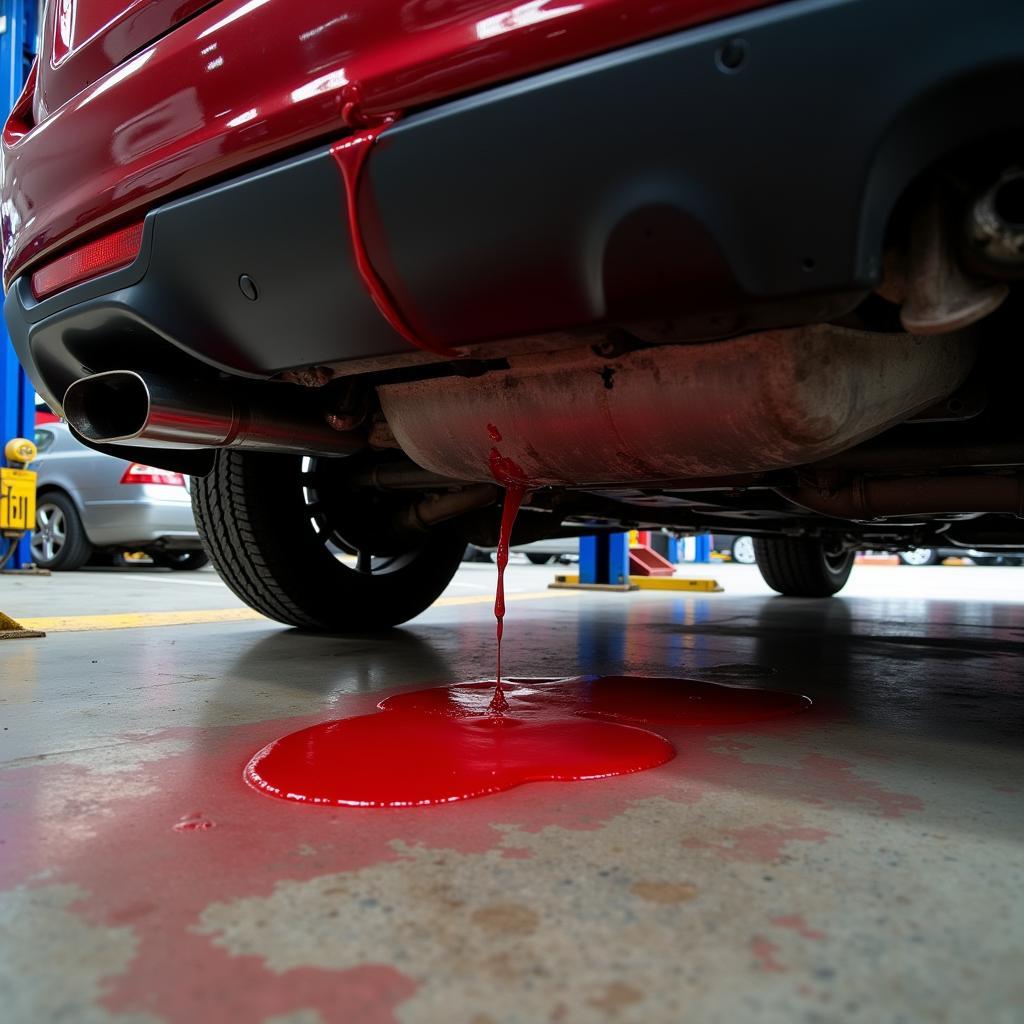A car accident, no matter how minor, can significantly impact your vehicle’s different systems, including the transmission. Experiencing transmission problems after a car accident is not uncommon. These issues can range from minor fluid leaks to severe damage requiring complete transmission replacement. Understanding the potential problems and knowing how to address them can save you time, money, and frustration.
 Transmission fluid leak after an accident
Transmission fluid leak after an accident
Common Transmission Problems After a Car Accident
Car accidents, even minor ones, can subject your vehicle to intense forces, potentially damaging the transmission. Here are some common transmission problems you might encounter post-accident:
- Fluid Leaks: One of the most apparent signs of transmission trouble is fluid leaks. The impact can cause cracks in the transmission pan, lines, or seals, leading to fluid loss.
- Slipping Gears: If you notice the engine revving high without a corresponding increase in speed or feel the gears changing erratically, your transmission might be slipping. This issue often arises from internal damage to the gears or clutch packs.
- Rough Shifting: A car accident can disrupt the delicate alignment of transmission components. This misalignment can result in rough or jerky gear changes.
- Inability to Shift Gears: In severe cases, the damage to your transmission might make it impossible to shift gears. This issue usually indicates significant internal damage.
What to Do If You Suspect Transmission Problems
Suspecting transmission problems after a car accident is a cause for immediate attention. Here’s what you should do:
- Check the Transmission Fluid: If it’s safe to do so, check your transmission fluid. Low or burnt-smelling fluid indicates a problem.
- Don’t Drive the Car: Driving a car with a damaged transmission can exacerbate the issue and lead to more costly repairs. Get it towed to a trusted mechanic.
- Contact Your Insurance Company: Report the accident and the suspected transmission problems to your insurance company. They will guide you through the claim process.
- Consult a Qualified Mechanic: A specialized mechanic with experience in transmission repair should thoroughly inspect your vehicle. They can accurately diagnose the problem and recommend the best course of action.
Diagnosing Transmission Problems
Diagnosing transmission problems requires a mechanic’s expertise. They will likely perform the following:
- Visual Inspection: Checking for visible damage to the transmission case, lines, and connections.
- Fluid Analysis: Examining the transmission fluid’s color, smell, and consistency to identify potential issues.
- Computer Diagnostics: Connecting a diagnostic tool to read the vehicle’s computer for error codes related to the transmission.
- Test Drive: Taking the vehicle for a test drive to observe its performance and identify any abnormal behavior.
Repairing Transmission Problems
The extent of repairs needed for your transmission depends on the severity of the damage.
- Minor Repairs: Minor leaks or sensor problems might require relatively simple and inexpensive fixes.
- Major Repairs: Internal damage to gears, clutch packs, or the valve body often necessitates extensive and costly repairs.
- Transmission Replacement: In cases of catastrophic damage, a complete transmission replacement might be the only solution.
Preventing Future Transmission Problems
While you can’t always prevent accidents, you can take steps to minimize the risk of transmission problems:
- Regular Maintenance: Adhering to your vehicle’s recommended maintenance schedule, including regular transmission fluid and filter changes, can prevent many problems.
- Safe Driving Habits: Practicing safe driving habits such as avoiding sudden acceleration and hard braking can reduce stress on your transmission.
- Promptly Addressing Issues: Addressing any transmission-related concerns, like leaks or strange noises, immediately can prevent minor issues from escalating into major problems.
“Regular transmission maintenance is key to ensuring its longevity,” says John Smith, a senior automotive engineer at XYZ Auto. “A well-maintained transmission can significantly reduce the risk of unexpected breakdowns and costly repairs.”
Conclusion
Experiencing transmission problems after a car accident can be stressful and expensive. Understanding the common issues, knowing what steps to take, and prioritizing preventative maintenance are crucial in protecting your vehicle and your wallet. If you suspect transmission issues after an accident, seek immediate professional help to diagnose and address the problem effectively.
If you are experiencing car trouble after a collision, our team at AutoTipPro can help. Contact us at +1 (641) 206-8880 or visit our office at 500 N St Mary’s St, San Antonio, TX 78205, United States.
FAQs
Q: Can a minor accident cause transmission problems?
A: Yes, even a minor accident can generate enough force to damage sensitive transmission components.
Q: How much does it cost to fix a transmission after an accident?
A: The cost varies depending on the severity of the damage. It can range from a few hundred dollars for minor repairs to several thousand for major overhauls or replacements.
Q: Will my insurance cover transmission repairs after an accident?
A: It depends on your specific insurance coverage. Contact your insurance provider to understand your policy’s terms.
Q: Can I drive with a damaged transmission?
A: It is highly discouraged to drive with a damaged transmission. Doing so can worsen the problem and lead to more expensive repairs.
Q: How can I prevent transmission problems after an accident?
A: While you can’t always prevent accidents, regular maintenance, safe driving habits, and promptly addressing any transmission-related concerns can significantly reduce the risk.
Have you been in an accident and suspect transmission problems? Learn more about common car collision issues and how to handle a used car having too much problems.






Leave a Reply